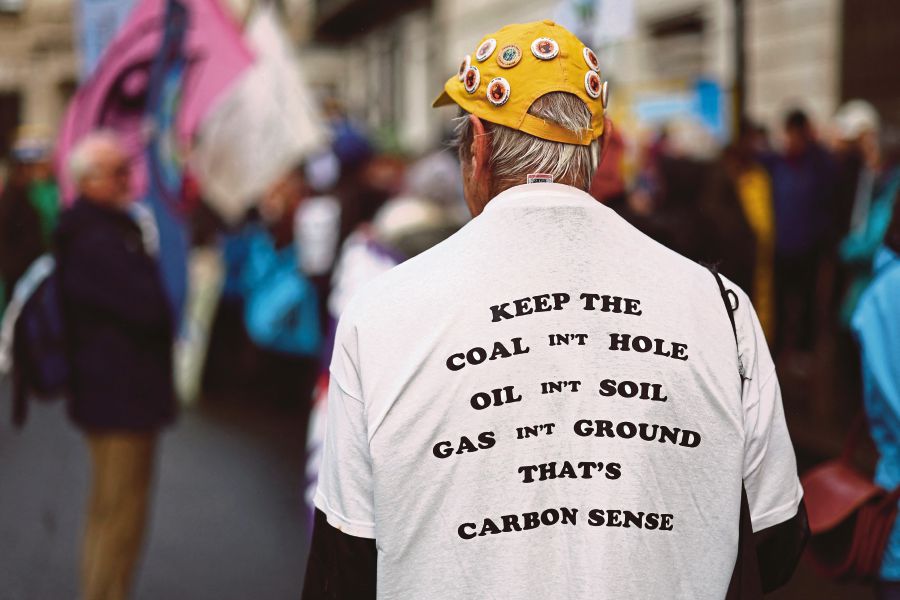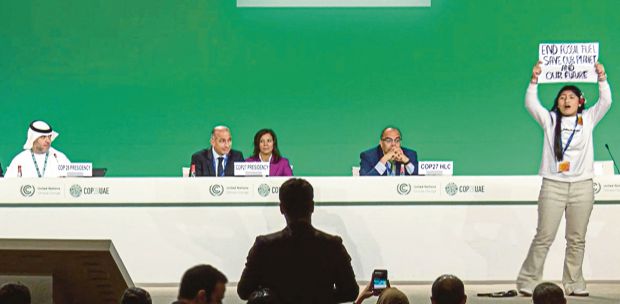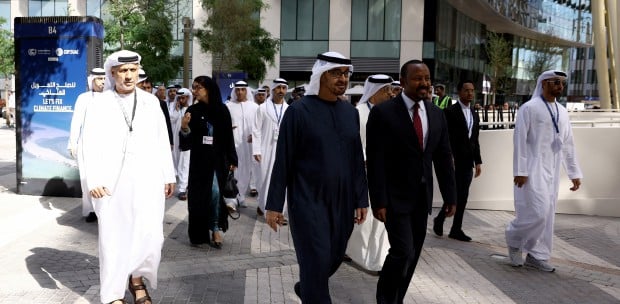AS Dubai's COP28 United Nations climate summit enters its final week, momentum has grown behind a global target to triple renewable energy such as wind and solar by 2030, with nearly two-thirds of countries putting their weight behind the pledge.
About 130 countries now back the goal, which aims to accelerate renewable energy capacity to 11,000 gigawatts (GW) in a bid to speed the world's transition to cleaner power.
"Massive scale-up of renewables is the fastest and most affordable way to put us back on track for 1.5°C," says Bruce Douglas, chief executive officer of the Global Renewables Alliance, an industry group backing the commitment.
But ensuring renewable capacity is put in place where it is needed most — such as to replace highly polluting coal power or serve growing cities — remains a challenge, particularly in countries investors see as risky, analysts say.
"Tripling needs to happen everywhere," Douglas says, noting that in many developing countries, the opportunity exists to more than triple clean power, with poor ones having the potential to "leapfrog fossil fuel generating infrastructure".
Under pre-existing country targets, renewable energy would double by 2030, from nearly 3,400GW to 7,250GW, according to estimates from Ember, a London-based energy think tank.
While COP28 negotiators move ahead on renewables, less progress is being made on other key divisions, particularly whether to include a call to "phase out" or "phase down" fossil fuels, including oil and gas, in the summit decision.
Coal, which countries agreed two years ago to "phase down", along with oil and gas are the main drivers of planet-heating emissions.
While agreement on the need to scale up renewables has emerged at COP28, capacity to do so differs hugely around the world.
Camilla Fenning from E3G, an energy think tank, says the bulk of the renewables acceleration will come from China — already the world leader in renewables, though it has yet to join the COP28 pledge — along with India, the United States and Europe.
She says growing agreement to boost renewables demonstrates in part how more developing countries see additional benefits from making the energy swap, including better health with less pollution and greater access to affordable energy.
In sub-Saharan Africa, for example, 567 million people lacked access to electricity in 2021, according to the International Energy Agency.
But major barriers remain to poorer countries stepping up renewable power, Fenning adds,
"The main issue holding back greater deployment in the Global South is the cost of capital for renewable projects," she says.
In COP28's host country, the United Arab Emirates, the Abu Dhabi Future Energy Company (Masdar) is targeting 100GW of renewable energy capacity by the end of the decade.
Niall Hannigan, its chief financial officer, says this will be a five- or six-fold increase in capacity.
His company has a track record of developing projects in more "challenging" marketplaces and owns the largest portfolio of operational renewable energy assets in Africa, he says.
Renewable projects need a clear policy framework from government to reassure developers, and grid infrastructure needs to be ready to take on renewable electrical power — something development banks could help finance, Hannigan notes.
"What we hate is uncertainty. Risk is different to uncertainty. Uncertainty is when things change all the time," he told the Thomson Reuters Foundation in an interview at COP28.
In Rwanda, the government created the Rwanda Green Fund, a vehicle to channel climate finance to help deploy projects, including renewable energy such as hydropower.
"We need to catalyse the ecosystem, so our main role is de-risking", or making projects more attractive to private investment, says Teddy Mugabo, the fund's first female chief executive officer.
She says the fund uses a wide range of tools such as grants, concessional finance and technical support to help prepare projects and reduce risks.
That includes offering zero-interest loans to conduct feasibility studies for hydropower plants, she says.
Even as countries looks to scale up renewables, however, they must keep in mind other goals, such as ensuring sufficient access to energy, which means Rwanda must be "realistic" about its energy mix, says Mugabo.
This includes using methane gas as part of the transition — a fossil fuel but one cleaner than diesel and coal, she says.
"What we're doing is we're not choosing between development and climate, but we want to develop in a climate-compatible way."
The writer is from Reuters news agency
The views expressed in this article are the author's own and do not necessarily reflect those of the New Straits Times





